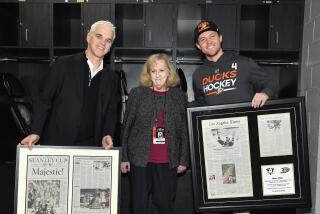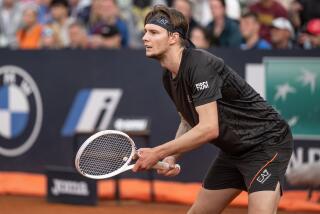McEnroe Is Aces at the Mike
- Share via
“Amazing grace, how sweet the sound
“that saved a wretch like me!
“I once was lost, but now I’m found,
“was blind but now I see.”
--From “Amazing Grace”
Speaking of redemption. . . .
If bad-to-the-bone basketballer Dennis Rodman wants a role model for a career change once he retires from head-butting, one’s available in John McEnroe, who, after sharpening his skills in the early 1990s, has become the best-ever brat-turned-broadcaster.
Who would have predicted that McEnroe--so often snarly, nasty, petulant and infantile on the court when line calls didn’t go his way--would turn out to be such a thoughtful tennis commentator on television?
But that he is, along with being great fun, outstanding in all phases of the job and as capable at play-by-play as analysis, his excellence reaffirmed this week during the USA Network’s swell coverage of the U.S. Open in Flushing Meadows, N.Y. No wonder Tennis Magazine anointed McEnroe “Best Announcer of 1996.”
You could also make a strong case for Mary Carillo, who works for HBO and CBS Sports, and who redefined the role of TV tennis analyst in the ‘80s and ‘90s and is still state of the art after all these years. Carillo doesn’t really qualify for this evaluation, though, because she was never a snot.
Then there’s McEnroe. . . .
You do wish at times, during hum-drum matches, that he would run down to the court, have a magnificent snit and chew out the umpire in the chair, just for old times sake. Rarely, though, are the televised matches bland. USA mostly follows them to their conclusion instead of jumping from one to another spasmodically. Its cameras perform ably. And from Bill Macatee, Jon Frankel and Ted Robinson to Barry MacKay and Tracy Austin, its tennis-announcing team is high quality, too.
Yet McEnroe alone seems able to raise his game to another level (as sportscasters say about ace jocks), and keep it there without ever sounding glib or losing the critical acuteness and easy affability that he brings to USA telecasts, especially when paired with Robinson.
The natural pauses that occur during a tennis match effectively make filling air time a continual challenge. McEnroe’s success behind the mike has much less to do with being a former great champion than with his ability to relate his smarts about the sport and its male players conversationally with puckish good humor, intelligence and the insight of an insider.
Oh, McEnroe is hardly spongy Martha Stewart. Never one to withhold strong opinions about tennis issues or players, he still can hit that wicked lefty slice serve (“I don’t wanna say he’s throwing in the towel but . . . “). And he’s susceptible to lapses of goofiness, proved by his comments a few years ago about female tennis commentators (like his old friend and former mixed doubles partner, Carillo) supposedly being unfit to fathom the nuances of the men’s game. Oh, please. When it comes to views about women, as the rest of the planet looks toward the 21st century, McEnroe appears still trapped in the 19th.
Yet he is just as apt to make fun of himself. “Poor guy is 24, [but] he looks like me already at 38,” he said about one player Wednesday, for example. “I don’t mean his looks, I mean his lack of hair.”
Later, he joked with former Aussie tennis great Rod Laver about hanging around pro tennis too long in pursuit of another Grand Slam championship: “I went seven or eight years believing futilely I could win another big one.”
The Laver sit-in seemed unscheduled. “Can we get another mike in here?” McEnroe asked. “We got Rod Laver here. Or is the budget too tight for that?” Always the diplomat.
Laver did get the mike, along with a dose of reverence from super-fan McEnroe, who recalled watching courtside as a kid while “the Rocket,” as Laver was known, competed in the U.S. Open. McEnroe said he was glad he never had to play Laver.
Well, you know, it’s TV. So the humility may have been false--no more than a polite gesture of respect from one former tennis giant to another, McEnroe not being known for having low self-esteem. Yet it did have a nice resonance. At a time when too many star pro athletes are amnesiac when it comes to the histories of their sports and appreciation of those who preceded them, McEnroe’s homage to Laver was fragrant and refreshing.
Tennis has never been more than a lukewarm ticket on TV in the ethnocentric U.S., perhaps because it’s truly international and periodically dominated by players from abroad whose long, multisyllabic names tend to merge in a blur. Yet great players make grand television in any sport. And at the very least, even non-aficionados can find the sounds of a match pleasing Muzak for doing other tasks.
CBS Sports will take over full-time coverage of the U.S. Open Saturday through Monday, after which USA will return for more weekday coverage before giving way to CBS again for the tourney’s concluding rounds.
McEnroe’s brother, Patrick, a solid tennis pro himself, is the studio analyst for CBS. The bigger, better news is not only that Carillo is lead commentator on CBS, but also that John McEnroe, too, is on the CBS team, continuing a part-time career in tenniscasting whose success surely no one could have foreseen.
So perhaps a spot behind the microphone also awaits Rodman, or Mike Tyson when he retires from taking meals in the ring. Hmmm. Or maybe not.
More to Read
Go beyond the scoreboard
Get the latest on L.A.'s teams in the daily Sports Report newsletter.
You may occasionally receive promotional content from the Los Angeles Times.










